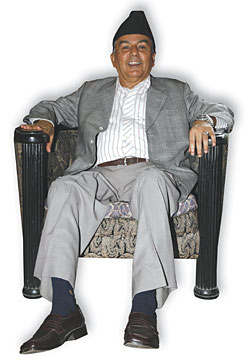 MIN RATNA BAJRACHARYA |
Unwittingly, the NC's Ram Chandra Poudel, the lone candidate for the prime minister, seems to have acquired the magic wand needed now in Nepali politics. Given the arithmetic in the Legislature-Parliament, he can't win the election for prime minister, but he can't lose either.
However, after his 12th defeat, his candidacy has a value that has so far not been exploited to end the deadlock. In this political monopsony, the bargaining position of the buyer is as powerful as that of a seller in a monopoly.
There have been multiple multi-point agreements since November 2005 among the political parties. Few of the provisions have been fulfilled, but what the political parties have failed to achieve the deadwood candidate could deliver.
Here's how. The parliamentary laws governing the election of the prime minister stipulate that once the process begins, it cannot be stopped unless it acomplishes the task it has set out to do: elect a new PM.
The laws also do not allow amendment to the existing provisions. Put simply, so long as Poudel stays in the race, neither Maoist Chairman Pushpa Kamal Dahal nor UML chief Jhalanath Khanal, who have withdrawn from the race, can become prime minister.
Surely, Speaker Subas Nembang owes an explanation to the public as to why he is allowing these serial elections without the political parties first reaching a consensus on the next prime minister. He has given in to pressure from the Maoists and the UML faction led by Khanal in continuing to hold one inconclusive election after another. Trust the stickler lawyer in Nembang to go by the book. He has ruled out any amendment, pointing out that the constitutional provisions and procedures cannot be flouted to begin a new process to form the government.
This might help explain the desperation of the two communist prime ministerial aspirants. The Maoist-UML three-point agreement, signed and announced on the day the NC's general convention began in Kathmandu so as to put pressure on the party and its prime ministerial candidate, has backfired on both the communist leaders.
As a result of that agreement, Dahal is now out of the race. To his horror, he found out that he can't become the prime minister unless Poudel backs out. Suddenly, Dahal has become the most flexible leader in Nepali politics thanks to Poudel's defunct candidacy. There's no way the situation can move forward without the two communist parties reaching an understanding with the NC. In other words, we can finally hope for some real compromise on contentious issues related to the peace process and drafting of the constitution.
The effect of Poudel's candidacy is already visible (and audible). The political parties have formed a task force to settle disputes over the provisions in the new constitution with Dahal as its chairman. The Maoists have also become flexible over speeding up the process of integration and rehabilitation of ex-Maoist combatants living in UN-monitored cantonments throughout the country. Given the history and fate of such flexibility, it is still too early to conclude whether these are meaningful developments but at least the political parties are talking about ways to minimise their differences.
Poudel's candidacy may actually lead to tangible and workable agreement(s) over contentious issues related to the peace process and drafting of the new constitution. There's no point asking Poudel to withdraw as some have done. The focus should be on how to extract the maximum out of his continuation in the race.
So, here's to deadwood candidacy.
Damakant Jayshi's column, My Take, will appear weekly from this edition of Nepali Times. damakant(at)gmail.com
READ ALSO:
Forcing tasks
Propaganda war, CK LAL
"We are not a failed state yet"



